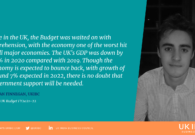Looking ahead to the UK-India Economic Financial Dialogue
This week will see the first Economic Financial Dialogue between the UK and India since 2017. A lot has changed globally in the last three months let alone the last three years so there will no doubt be lots to talk about when Rishi Sunak, UK Chancellor of the Exchequer, and Nirmala Sitharaman, Indian Finance Minister, meet virtually on Wednesday.
At UKIBC we are very grateful to have our Chair, Richard Heald, sitting on the India UK Financial Partnership (IUKFP) board helping to steer the EFD and push our key advocacy asks.
It was April 2017 when the last meeting took place, discussing key topics such as: trade and investment in financial services; improving the business environment; financing India`s growth; and development of fintech.
So, has much changed on these topics since then? On the trade and investment front we all know that India in now the 2nd largest investor in the UK in FDI terms and the UK is the 2nd fastest growing G20 investor in India over the last ten years. However, if we look at the trade aspect then whilst overall bilateral trade is up 10 percent last FY to £24b all the growth was in Indian exports, with UK exports actually dropping by 6.6 percent (£550m) so there is still work to do.
There are large interdependencies between trade and investment and improving the business environment. I am sure you are all waiting with bated breath for the launch of our annual Doing Business in India Report this Thursday. If the trend from previous reports continues, bureaucracy, legislation, taxation and policy certainty will continue to be the main barriers for business in the market.
The removal or reduction of non-trade barriers would have a significant positive affect on trade and investment. Take for instance insurances services in India. At present international firms can enter the Indian market as part of a joint venture with a maximum investment of 49 percent. The UKIBC has long stated that, just like insurance brokerage, this level should be lifted to 74 percent allowing for innovation and investment in this sector.
Financing India`s Growth is also still very much an issue. As I pointed out in my last blog on Opportunities for Sustainable Investment in India, India needs to invest USD 450b a year for the next 10 years to meet its urban sustainability and renewable energy targets. There is therefore a huge opportunity here especially in the new ESG (Environmental, Sustainable and Governance) funds but, as I also mentioned in my last blog, 1 percent of the global investment pot is currently invested in India compared to 18 percent in Europe! Given the opportunities and need in India I would hope that this changes.
The final topic in the last round was Fintech. London continues to be one of the world leaders in this area however the talent coming from India and the huge serge in digital payments has made India a real player also in this space. There is still a lot to do in this area as regulators try to keep up with the fast pace of change that comes from disruptive technologies. There is also of course the impending Data Localism act in India which my excellent colleague Meghna has been writing about which will have a huge impact on the entire financial and professional services landscape in India.
Given the above I feel that this year’s EFD will pretty much be more of the same please as there is a lot of unfinished business on these key areas. I for one would very much like to see insurance and data added to the mix as these are real areas of opportunity for India where the UK can support. Whatever announcements come out on Wednesday anything that both governments can do to bring some certainly in an uncertain world will be greatly appreciated by the F&P community.

 By christopher heyes
By christopher heyes 



